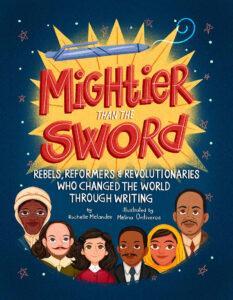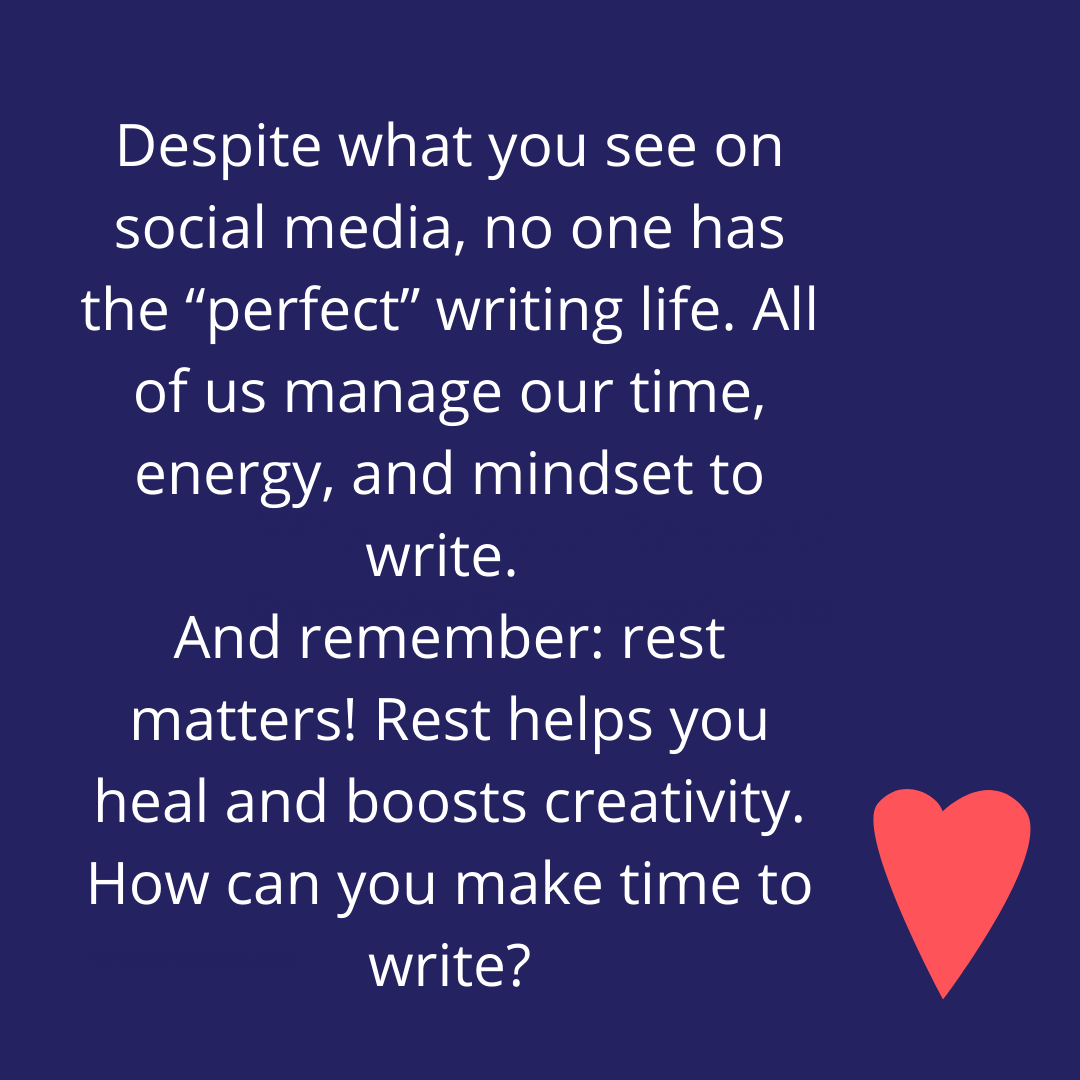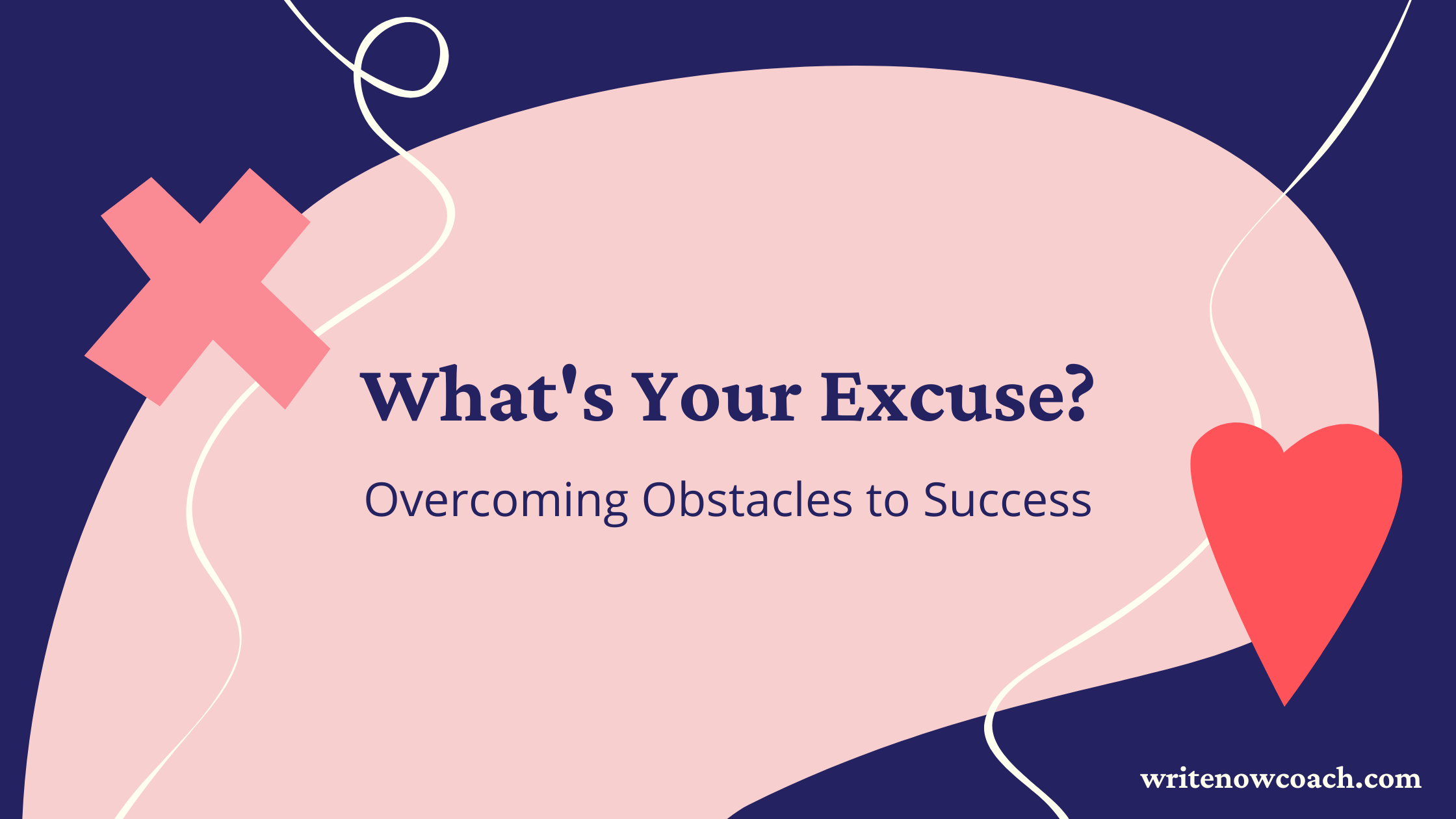Overcome Obstacles and Succeed
July 13, 2021
Note From Rochelle
Dear Writers,
I’d love for you to help me celebrate my new book by attending my launch event. It’s an online event—so you can attend from wherever you are. But you do need to register. Check out the event page on Facebook or Boswell Book Company for more information.
Today’s post talks about how to overcome the common obstacles and excuses we face as writers.
Enjoy!
Rochelle
What’s Your Excuse?
Overcome Obstacles to Success
by Rochelle Melander
 I spent the past few years researching and writing the book, Mightier Than the Sword: Rebels, Reformers, and Revolutionaries who Changed the World through Writing. For the project, I needed to learn about new writers. As I read their stories, I realized that everyone I profiled overcame great obstacles to achieve success. In today’s post, I’m looking at the common obstacles we face as writers. Sometimes these obstacles become excuses for not moving forward. Sometimes they just worry us, making it harder to write. For each obstacle, I show you how writers have overcome them—and how you can, too.
I spent the past few years researching and writing the book, Mightier Than the Sword: Rebels, Reformers, and Revolutionaries who Changed the World through Writing. For the project, I needed to learn about new writers. As I read their stories, I realized that everyone I profiled overcame great obstacles to achieve success. In today’s post, I’m looking at the common obstacles we face as writers. Sometimes these obstacles become excuses for not moving forward. Sometimes they just worry us, making it harder to write. For each obstacle, I show you how writers have overcome them—and how you can, too.
Obstacle #1: I didn’t do well in school. I’m not smart enough.
Charles Darwin often skipped school to do chemistry experiments with his older brother. He wrote in his autobiography: “I believe that I was considered by my masters and by my Father as a very ordinary boy, rather below the common standard in intellect.” At college, he did poorly at medical school and divinity studies but excelled at natural science. He followed his passion for beetles and other natural phenomena on a trip around the world—which provided the best education and led him to find his big idea.
Write Now! Many people who don’t excel at formal schooling do succeed at writing. The secret? They pursue something that matters to them. Call it passion or purpose or simply curiosity—it drives them to succeed. What drives you to write?
Obstacle #2: I don’t have any original ideas.
Neither did Shakespeare! Shakespeare built many of his plays around books and poems he’d read. He borrowed plots and characters and used them to tell his own stories. Today, many writers take plots and people from novels in the public domain and use them to build their own stories. Just look at the many Jane Austen tribute books out there! (For example: Pride and Premeditation by Tirzah Price and Eligible by Curtis Sittenfeld.)
Write Now! You may not think you have any special knowledge or original ideas, but you do have ideas. You may even have a story to tell. What is it? How can you learn from reading existing stories?
Obstacle #3: No one’s interested in my ideas!
When Rachel Carson pitched her article on the environmental effects of DDT, Reader’s Digest rejected it. She wrote a book instead, Silent Spring, which launched the environmental movement. When Charles Darwin’s friends spoke about his big idea at the Linnean Society of London, the president wrote in his notes that the meeting lacked “any of those striking discoveries which at once revolutionize.” His book on evolution changed the way we think about the universe (it’s fluid, not permanent) and influenced psychology, anthropology, medicine, agriculture, and more.
Write Now! It takes time to find the right readers. Keep trying. Write and publish anyway. What’s one step you can take to find the right audience, whether that’s an editor, agent, publisher, or reader?
Obstacle #4: I’m too young. I’m too old.
Don’t let anyone tell you that your age prevents you from writing. S.E. Hinton wrote The Outsiders when she was still in high school. Harriet Doerr was 73 years old when her novel Stones for Ibarra was published. It won the National Book Award.
Write Now! Age doesn’t matter. The next year will pass by whether you write or not. What would you like to accomplish?
Obstacle #5: I have a chronic illness. I struggle with energy.
Charles Darwin was ill much of his life. Because of that, he dedicated his morning to work and took much of the rest of the day for rest and reading. After breakfast and a morning walk, he’d work for an hour and a half. He took a break to read and answer letters or listen to his wife read him a novel. At ten thirty, he’d work on his experiments. After lunch, he wrote more letters, took a walk, and napped. Oh yeah, and he often allowed his children to work beside him in his study. Despite his chronic illness, Darwin wrote 14 books, several monographs, and thousands of letters. (https://dailyroutines.typepad.com/daily_routines/2008/12/charles-darwin.html)
Write Now! As Tim Gunn says, “Make it work.” Despite what you see on social media, almost no one has the “perfect” writing life. All of us manage our time, energy, and mindset to write. And remember: rest matters! Not only does it help you to heal, it also boosts your creativity. How can you make time to write?

What’s your obstacle? What’s your superpower?
What obstacles keep you from writing? What helps you overcome them? Leave your comment below for your chance to win …
Preorder the book!
 If you’d love to read more about Anne Frank or other writers who changed the world, preorder my new book, Mightier Than the Sword at Bookshop, your local bookstore, or wherever you shop online.
If you’d love to read more about Anne Frank or other writers who changed the world, preorder my new book, Mightier Than the Sword at Bookshop, your local bookstore, or wherever you shop online.
NOTE: The books links lead to the Write Now! Coach bookstore on Bookshop.com. Write Now! Coach receives a small percentage of your purchase, which helps to support this blog.










It’s easy to have obstacles, but superpowers must be cultivated. One obstacle is that I’m a mother of an almost 4-year-old, which limits my time to write. But I turn that into a superpower by being more productive with the time I have and becoming inspired by her, especially since I’m a children’s author.
I also have chronic insomnia and an autoimmune disorder, which definitely affects my energy levels. But I find a routine that works for me, including writing in the afternoon when I’m most energized, practicing mindfulness, and drinking herbal tea to help conserve and boost my energy.
I’m currently working on a picture book based on Japanese folklore. It is a hard sell in the climate of #ownvoices but I have a strong tie to the culture given that my husband is Japanese and my daughter is half Japanese. With the support of my husband and Japanese family, diligent research, and cultural appreciation, I know this story will find a home.
The book sounds wonderful! And I love your routine!
Hi Rochelle ~
Thank you for this inspiring blog post. Your question “What obstacles keep you from writing? What helps you overcome them?” is so on the spot today. I just had a major operation (hysterectomy with removal of large tumours on my ovaries) and am in full recovery. I can’t do much but I can sit at my computer and do the final edits on my memoir that I wish to publish this month. The obstacles are – not feeling well all the time; get tired easily; head spaced because of medications; not being able to walk long distances, which used to inspire me… The way I’m learning to overcome these obstacles is to:
pace myself and check in with my body constantly; write longhand or take notes on my phone then incorporate the notes on my laptop in the afternoon when I’m ‘resting;’ walk short distances and rest; take a walk in my garden, then sit on my patio chair and write about how I feel today… do I want to work on my glossary or the bibliography? Or do I want to re-read a chapter to make sure it sits right in the flow of my story.
I feel at least I’m doing something constructive until I can sit for longer periods and write… write away!
Blessings
Rarye
I am so glad that writing is providing a way to help you heal. I love your plan for overcoming obstacles!